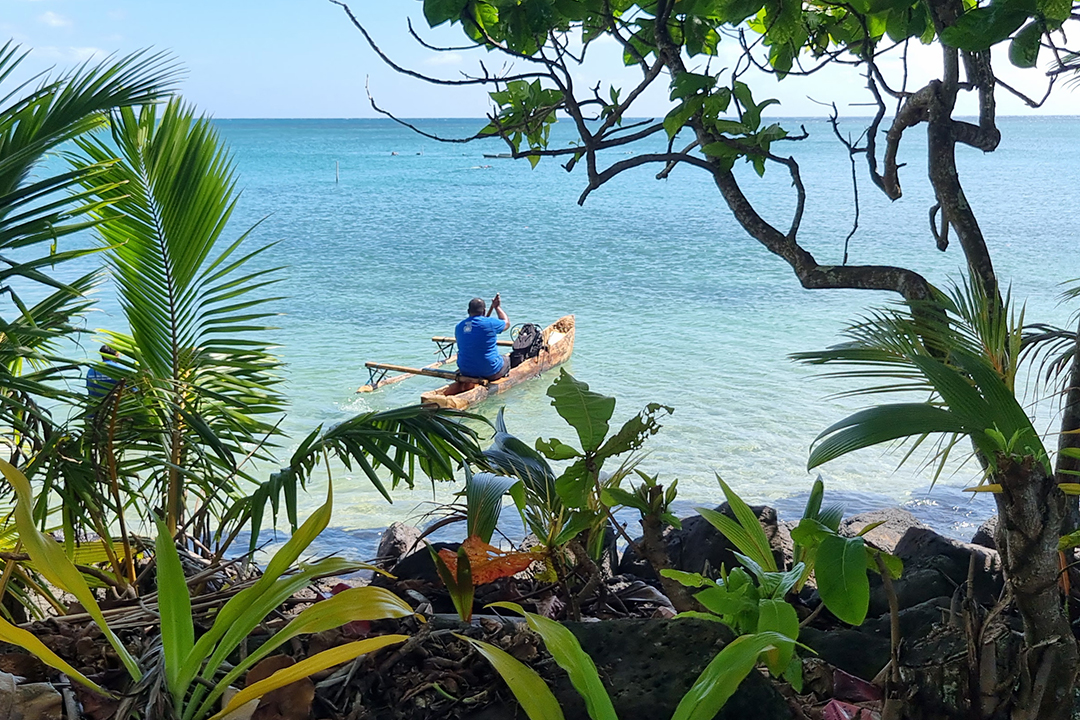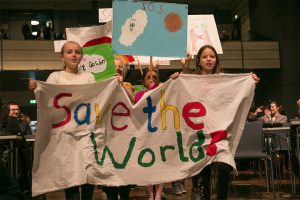Nature, Land, and Oceans Day – one of the thematic days at the UN Climate Change Conference (UNFCCC COP 28) in Dubai, United Arab Emirates (UAE) – took place on 9 December. The Earth Negotiations Bulletin (ENB) covered several side events related to these topics. Artificial intelligence (AI) was also a prominent topic of discussion.
A high-level event on sustainable ocean management, hosted by the Marrakech Partnership on Land Use and on Ocean and Coastal Zones, focused on state and non-state commitments to improve sustainable ocean planning through developing and implementing Sustainable Ocean Plans (SOPs). Speakers emphasized that SOPs are integral to addressing the Ocean Breakthroughs, a set of science-based targets launched ahead of COP 28, which provide a blueprint to deliver on climate and nature goals.
Speakers described the High Level Panel for a Sustainable Ocean Economy as the “lighthouse” to get there, reaffirmed that 30% of the ocean must be protected by 2030 so marine life can be restored, highlighted the work of National Geographic’s Pristine Seas programme, which, since 2008, has helped create 26 of the largest marine protected areas (MPAs) in the world; and warned that tourism has created land dispossession for local Pacific islanders.
During panel discussions, they mentioned:
- the establishment of the Ocean Action 2030’s Rapid Assistance Fund (RAP), which will be launched in January 2024 to support the development and implementation of national SOPs and strengthen the role of local and Indigenous participation in sustainable ocean management;
- the Marine Shipping Challenge, launched at COP 27, which culminated in USD 3 billion in investments to decarbonize the maritime sector and marine corridors by 2050;
- the Ocean Action 2030 Coalition to offer technical assistance and ocean diplomacy in support of SOPs;
- efforts to transform the vision of the High Level Panel for a Sustainable Ocean Economy into domestic plans for a sustainable ocean economy; and
- the Blue Prosperity Coalition, launched at COP 28 to support blue economies, marine protection and spatial planning, and sustainable fisheries.
A discussion on how global leaders are supporting Ocean Breakthroughs highlighted Deutsche Bank’s support for the Ocean Risk and Resilience Action Alliance’s (ORRAA) #BackBlue Finance Commitment, which supports greater investments in coral reef remediation and more effective management of MPAs. One speaker underscored the need for greater collaboration between the nature and climate change communities, pointing to the joint statement by current COP Presidents of the Rio Conventions calling for a coordinated approach to tackle climate change, desertification, and biodiversity loss, as a good start.
A CGIAR-organized event explored how scientific assessments can help achieve sustainable agrifood systems that bolster food security. It focused on the role of scientific bodies in providing the evidence necessary to understand the trade-offs and synergies between climate change and food security.
Jim Skea, Chair, Intergovernmental Panel on Climate Change (IPCC), highlighted the Special Report on Climate Change and Land as the first IPCC report to address the food system as a whole. Noting increased collaboration among IPCC Working Groups and links to Intergovernmental Science-Policy Platform on Biodiversity and Ecosystem Services (IPBES) assessments in the Sixth Assessment Report, Skea said such “cross-pollination” of ideas will be a significant focus of the Seventh Assessment Report.
Diána Ürge-Vorsatz, IPCC Vice-Chair, highlighted biases in Western knowledge production systems, urged integrating a diversity of knowledge systems into scientific assessments, and mentioned an upcoming expert meeting on gender diversity and inclusivity.
George Wamukoya, African Group of Negotiators Expert Support, noted that most assessment authors within Africa come from South Africa and pointed to gains in establishing a broader base of scientists from all over Africa who can respond to IPCC assessment scoping calls.
Another event addressed the importance of standards of practice and harmonized monitoring tools for achieving the goals of the UN Decade on Ecosystem Restoration 2021-2030. It further highlighted that scaling up ecosystem restoration will require tangible, on-the-ground actions to combat climate change, biodiversity loss, food insecurity, and land degradation. Ayadi Mishra, Youth Representative to the UN Decade Advisory Board, drew attention to policy tools and guidance, such as the Framework on Ecosystem Restoration Monitoring (FERM), to track restoration of degraded ecosystems. Mirey Atallah, UN Environment Programme (UNEP), cited the State of Finance for Nature 2023 report, which emphasizes the need to repurpose the annual amount of USD 7 trillion for nature-negative investments and channel it towards nature conservation, which, in contrast, currently receives about USD 200 billion per year. The Food and Agriculture Organization of the UN (FAO) organized the event.
Co-hosted by CGIAR, the UK Foreign Commonwealth and Development Office (FCDO), and the World Bank Group, an event on an Agriculture Breakthrough focused on the Breakthrough Agenda, which aims to accelerate decarbonization in, among others, the shift to sustainable agriculture. Ismahane Elouafi, Executive Managing Director, CGIAR, highlighted that the Agriculture Breakthrough as part of the Breakthrough Agenda aims to make climate-resilient, sustainable agriculture the most attractive and widely adopted option for farmers by 2030.
Andrew Mitchell, Minister of State for Development and Africa, FCDO, highlighted the UK White Paper, ‘International Development in a Contested World: Ending Extreme Poverty and Tackling Climate Change,’ which details ways of contributing to lasting solutions to famine, resilient agrifood systems, and the SDGs. He mentioned the launch of the CGIAR UK science center to develop new climate-resilient crops and identify risks to global food systems. Mohammed Sadiki, Minister of Agriculture, Maritime Fisheries, Rural Development, and Water and Forests, Morocco, highlighted his country’s plans to replant thousands of hectares of cactus to boost multifunctional agricultural production. A panel discussion focused on initiatives and tools to advance the COP 28 Food Systems Transformation Agenda. Speakers drew attention to, among others, the ‘Principles for Just Food System Transitions’ report.
Another event, organized by the Marrakech Partnership for Global Climate Action Pathways on Land Use and Ocean and Coastal Zones, the High-Level Climate Champions, the Ocean & Climate Platform, FAO, and the International Union for Conservation of Nature (IUCN), showcased land and ocean initiatives spearheaded by non-state actors to reverse biodiversity decline by 2030, increase ecosystem and human resilience to climate change, and achieve a sustainable balance within planetary boundaries.
The first panel reflected on experiences of non-state actors working to support sustainable land use, with one speaker pointing to scientific evidence showing that Indigenous Peoples are more effective stewards of land in areas where their territories are secure. The second panel, on the interconnection between land and sea, highlighted the important role of coastal communities in building resilience with examples presented from Senegal, Kenya, and Samoa, as well from the private sector. The final segment focused on solutions to support ocean conservation and coastal resilience, with speakers mentioning: success with the Geneva Nature-based Solutions Dialogues; and the need for more resources to support the ocean, noting that SDG 14 (life below water) is the least funded SDG.
The UNFCCC Technology Mechanism’s Initiative on Artificial Intelligence for Climate Action explored how AI might transform climate solutions, with a high-level event discussing the potential for AI to accelerate implementation of the Paris Agreement on climate change.
Speakers stressed: the potential of AI to predict climate impacts and improve the dynamic management of energy supply and demand; that AI can enhance the efficiency of energy systems and inform policy decisions, with responsible development and appropriate regulations; and AI can crunch massive data sets and give insights in real time.
A panel discussion presented examples of on-the-ground AI applications. Principles of local empowerment, equitable access, and strong governance frameworks were highlighted, with projects in Indonesia and Kenya using AI to protect forests and predict crop yields with the involvement of local communities as examples. The use of remote sensing and AI to provide early warning systems and the Early Warnings for All initiative, which highlights technology and innovation for disaster risk knowledge, were also discussed. In addition, the AI Innovation Grand Challenge to develop AI-powered climate solutions in developing countries, was launched.
The event was organized by the UNFCCC Technology Executive Committee (TEC), the Climate Technology Centre and Network (CTCN), and the COP 28 Presidency.
SDGs
Issues
- Adaptation,
- Agriculture & Food Security,
- Desertification & Land Degradation,
- Mitigation,
- Conservation,
- Biodiversity,
- Climate Change,
- Economics & Investment,
- Sustainable Use,
- Gender,
- Governance,
- Health,
- Human Rights & Indigenous Peoples,
- Human Settlements & Population,
- Land,
- Monitoring & Evaluation,
- Oceans & Coasts,
- Science,
- Sustainable Development,
- Stakeholder Participation,
- Tourism

